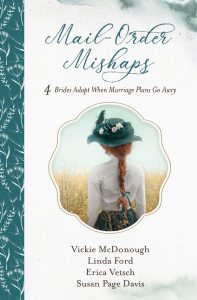by Erica Vetsch, @EricaVetsch
When I recently searched amazon.com for books on “How to Write Fiction” more than 20,000 possibilities came up.
A search of my local library’s database showed they had access to more than 800 different titles on the fiction writing craft.
My local bookstore, a Barnes & Noble, had dozens of volumes shelved under the writing how-to section.
I have friends who have written books on the craft of writing fiction. I’ve even contributed to a few myself.
When it comes to books on how to write books, it seems the possibilities are endless!
So how does one go about choosing the right How-To books that will be really helpful? Here are some tips from someone who used to have a fairly vast library of how-to books, but has culled it down to a mere handful that work for her.
- When you’re new to writing, just about any craft book will have helpful information.
If you’ve never written fiction before, or you’re just starting to get serious about seeking publication, there is so much to learn, it can be like trying to take a sip of water from a fire hydrant. Choose books that cover the basics. Start broad before you get specific. You need to understand story structure before you worry about subtext. Learn about characterization before you dive into epizeuxis. Get a grasp of the big issues like Point of View and Showing vs. Telling before you try to conquer the finer points of writing fiction.
- Consider your genre.
Different genres have different skills and structures, and different reader-expectations. Different genres call for different authorial voices. Are you writing romance? Paranormal? Thriller? Mystery? Women’s Fiction? Each of those genres has different hallmarks that make them what they are. And there are subgenres to consider: Historical Romance, Amish Suspense, Techno-Thriller. There are many books out there on how to write for a specific genre. If you don’t know what genre you’re writing, take some time to figure it out. You can’t sell your work effectively until you know what it is and where it would be shelved at Books-A-Million.
- Evaluate your writing objectively and consider where you are weakest.
Is it dialogue? Characterization? Plot? Every writer has weaknesses. If you can’t find yours, send your work to a critique partner. They’ll let you know. 
- Not all of a writer’s life is on the page.
Do you need help balancing the writer’s life? Dealing with rejection? The business side of writing? Marketing? Taxes? There are great books out there, specific to writers, that will help you navigate the life of being a writer. Nobody is born knowing how to do this stuff, but we can learn from those who have gone before us and been successful.
- Excellent fiction can be a great teacher.
Reading great fiction is where writing great fiction needs to start. Read the best authors in the business…for pleasure, yes, but more importantly, to see why the book is so good, what makes it appealing to readers and successful in a crowded market. Read in your genre, and read outside your genre. Study dialogue, character development, theme, subtext, structure, twists, and more. Deconstruct and outline great fiction so you can mimic what’s working in your own writing.
- Here’s the most important thing to know when it comes to choosing great writing how-to books: Not one of them will make the task of writing a great book easier. There is NO MAGIC BULLET that will make a story fall out of your head with no effort.
The purpose of writing how-to books isn’t to make writing easier, it’s to make writing better. They give you the tools to hone your craft and polish your words, to be deliberate about your choices when it comes to plot, characterization, and the rest. But knowing how to do something and doing well are two different things. You will still need to carve out time to write your story. You will need to practice, to learn, to delete, and write again. Writing how-to books are tools. You still need to open your toolbox and use those tools to craft and create the best book you can.
Do you have a section of books in your personal library that teach you how to write fiction? How did you choose them? Were you looking for a magic bullet, or to put some tools into your writing toolkit that would make what you wrote better?
Dreams of Finding Mr. Right Go Wrong in the Old West — The Galway Girl by Erica Vetsch Kansas, 1875 A mail-order mix-up sends Irish lass Maeve O’Reilly to the Swedish community of Lindsborg, Kansas. Will Kaspar Sandberg consider it a happy accident or a disaster to be rectified as soon as possible?

ERICA VETSCH can’t get enough of history, whether it’s reading, writing, or visiting historical sites. She’s currently writing another historical romance and plotting which history museum to conquer next! You can find her online at www.ericavetsch.com and on her Facebook Page where she spends WAY TOO MUCH TIME! www.facebook.com/EricaVetschAuthor/


